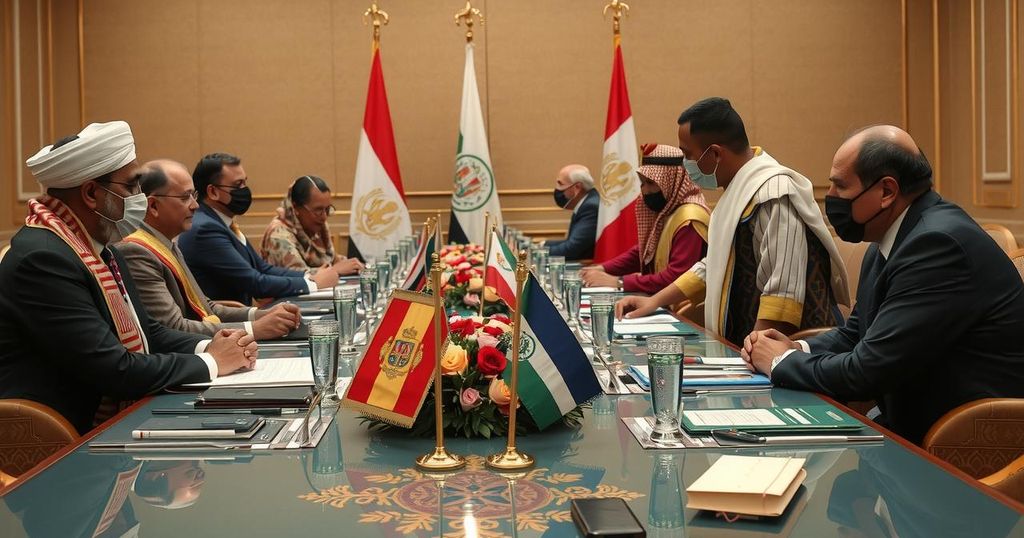Egypt Hosts Turkey and Iran Presidents at Critical D-8 Summit Amid Regional Turmoil

Egypt is hosting a summit featuring the presidents of Turkey and Iran, highlighting the evolving dynamics of non-Arab influence in the Middle East. The event focuses on territorial conflicts, including the situation in Gaza and maritime security threats posed by Iranian-backed Houthi forces. The summit underscores the importance of cooperation among Muslim-majority nations amid declining Arab dominance.
On Thursday, Egypt convened the leaders of Turkey and Iran at a significant summit of Muslim-majority countries known as the Developing-8 (D-8). Taking place in the New Administrative Capital near Cairo, this event underscores the increasing influence of non-Arab nations in the region’s dynamics amidst ongoing turmoil involving Iran and Turkey. Notably, the summit arrives as Iranian-backed militant group Hamas faces diminished strength following a prolonged conflict with Israel, while Hezbollah, Iran’s key militia in Lebanon, has also suffered losses amidst the hostilities.
The participation of Turkish President Recep Tayyip Erdogan and Iranian President Masoud Pezeshkian marks a pivotal moment, as they come together for the first time following the fall of Syrian president Bashar Al Assad’s government earlier this month. The ongoing consultations between Egypt and Iran reflect the latter’s historical tensions stemming from the Islamic Revolution in 1979; however, no formal upgrade in diplomatic ties has yet been achieved. Cairo persists in advocating for Iran to cease its involvement in Arab affairs and its support for non-state actors throughout the Middle East.
Key discussions at the summit are expected to include the Israeli-Palestinian conflict, especially the recent violence in Gaza, alongside the ramifications of Houthis’ attacks on maritime shipping routes in the Red Sea. These assaults have significantly impacted Egypt’s revenues from the Suez Canal, raising bilateral concerns about regional stability and security. Despite past hostilities, a thaw in relations has fostered cooperation between Egypt and Turkey on trade and intelligence sharing, highlighting the complex interplay of alliances in the region.
The D-8, which also includes nations such as Nigeria, Pakistan, and Indonesia, aims to enhance cooperation among its members since its establishment in 1997. The evolving geopolitical landscape in the Middle East necessitates a reevaluation of traditional power centers as non-Arab actors like Turkey and Iran increasingly shape regional outcomes.
In conclusion, the D-8 summit in Egypt, featuring Turkey and Iran, serves as a significant indicator of the shifting dynamics within the region, illustrating the diminishing Arab influence and the growing roles of non-Arab countries. As these nations navigate the complexities of conflict and cooperation, the implications for regional stability and diplomatic relations could be profound. The discussion of critical issues such as the Gaza conflict and maritime security underscores the urgency of collaborative engagement among these key players.
The ongoing dialogue between Egypt and Iran, although historically fraught, points to a potential recalibration of their relationship, emphasizing the necessity for dialogue in resolving longstanding tensions and addressing pressing regional challenges.
The Developing-8 Organization for Economic Co-operation is an alliance of eight Muslim-majority nations aimed at promoting economic development and cooperation. Established in 1997, the group has emerged as a platform for discussing vital issues affecting member states, particularly those facing geopolitical instability. The current summit highlights a crucial moment for Turkey and Iran, as both nations experience shifts in their regional influence due to changing dynamics in the Middle East, exacerbated by conflicts in Syria and Gaza, as well as disruptions in maritime security caused by Houthi attacks.
In summary, the summit in Egypt representing the D-8 nations signifies a pivotal moment for regional cooperation among Muslim-majority countries. The participation of Turkish and Iranian leaders illustrates the shifting power dynamics in the Middle East, as traditional Arab influences wane. The summit’s discussions surrounding critical conflicts, particularly in Gaza and maritime security, highlight the urgent need for collaborative efforts to address contemporary challenges while fostering improved diplomatic relations and regional stability.
Original Source: www.thenationalnews.com








